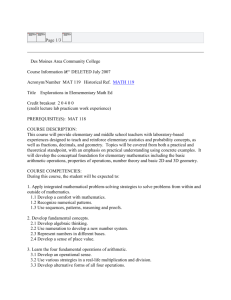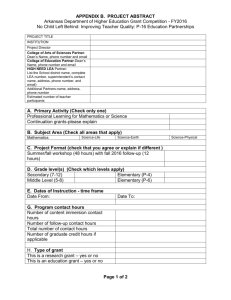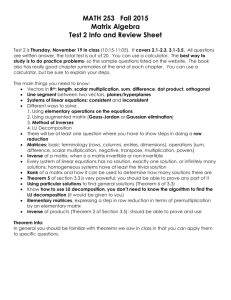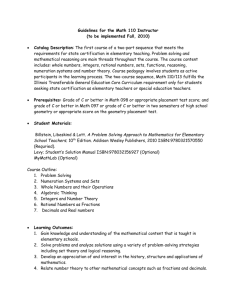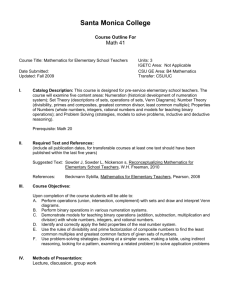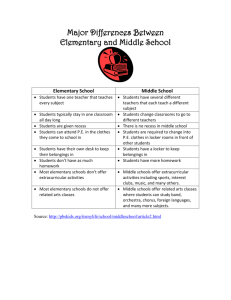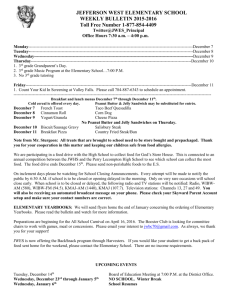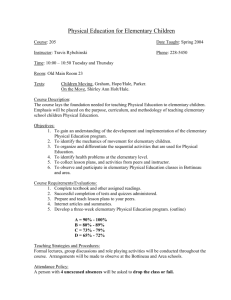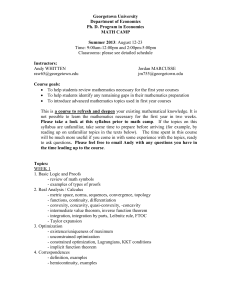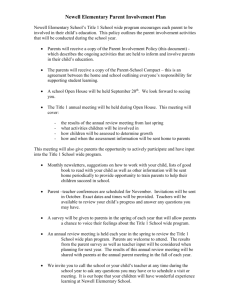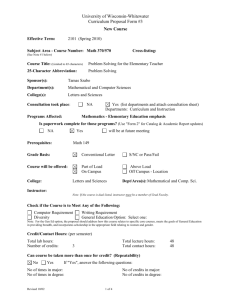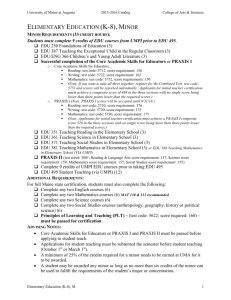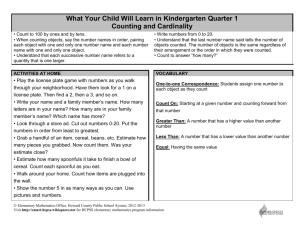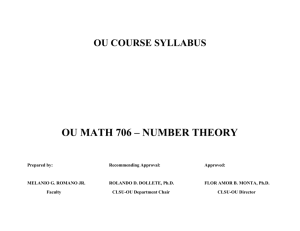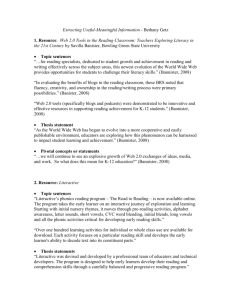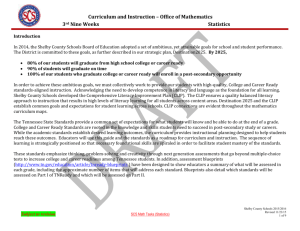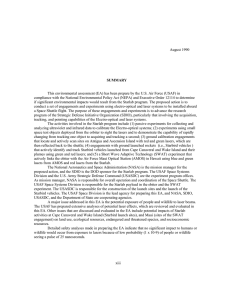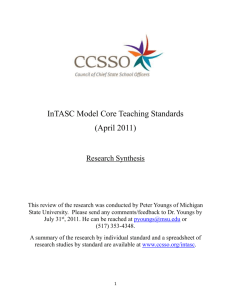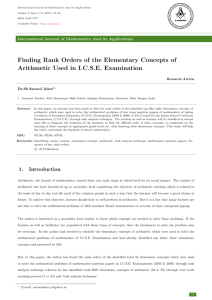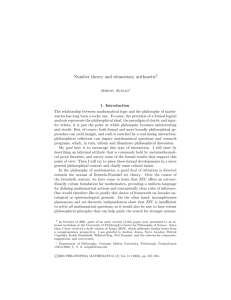Elementary Number Theory Course Proposal
advertisement
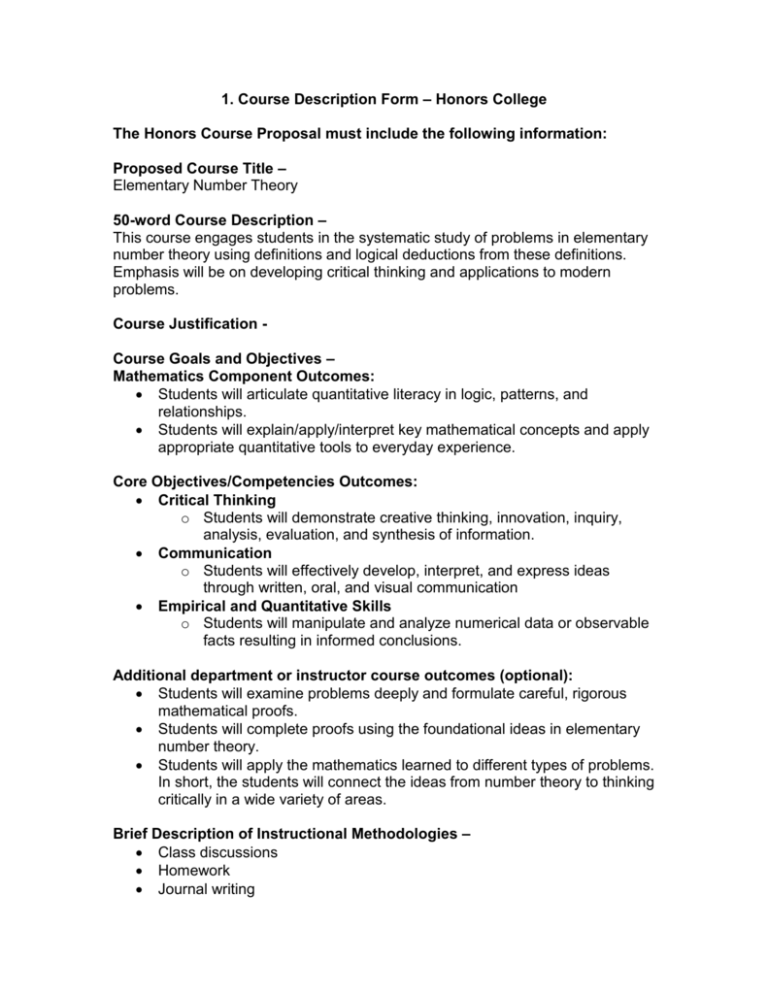
1. Course Description Form – Honors College The Honors Course Proposal must include the following information: Proposed Course Title – Elementary Number Theory 50-word Course Description – This course engages students in the systematic study of problems in elementary number theory using definitions and logical deductions from these definitions. Emphasis will be on developing critical thinking and applications to modern problems. Course Justification Course Goals and Objectives – Mathematics Component Outcomes: Students will articulate quantitative literacy in logic, patterns, and relationships. Students will explain/apply/interpret key mathematical concepts and apply appropriate quantitative tools to everyday experience. Core Objectives/Competencies Outcomes: Critical Thinking o Students will demonstrate creative thinking, innovation, inquiry, analysis, evaluation, and synthesis of information. Communication o Students will effectively develop, interpret, and express ideas through written, oral, and visual communication Empirical and Quantitative Skills o Students will manipulate and analyze numerical data or observable facts resulting in informed conclusions. Additional department or instructor course outcomes (optional): Students will examine problems deeply and formulate careful, rigorous mathematical proofs. Students will complete proofs using the foundational ideas in elementary number theory. Students will apply the mathematics learned to different types of problems. In short, the students will connect the ideas from number theory to thinking critically in a wide variety of areas. Brief Description of Instructional Methodologies – Class discussions Homework Journal writing Small group discussions Assessment of Student Learning – Number Theory Notebook Homework Journal Weekly Quizzes Midterm Final Exam Total Points: 50 points (10%) 100 points (20%) 50 points (10%) 100 points (20%) 100 points (20%) 100 points (20%) 500 points (100%) Course Outline– Week 1: The integers – bases. Axioms for the integers, ordering and divisibility Week 9: Complete and reduced residue systems. Fermat’s Little Theorem and Wilson’s Theorem Week 2: Logic Week 10: Chinese Remainder Theorem. Polynomials and division algorithm Week 3: Trichotomy, factorial notation, perfect squares. Properties of multiplication, positives and negatives Week 11: Factor theorem, roots of polynomials, and order of elements Week 4: Modular arithmetic, properties of congruences. Weak induction, well-ordering Week 12: Z mod p is cyclic. Units and Euler’s Phi Function Week 5: The division algorithm. Euclid’s algorithm and the magic table Week 13: Coding theory and raising numbers to large powers Week 6: Greatest common divisor, least common multiple. Strong induction, primes, prime factorization Week 14: Weak, strong pseudo-prime tests Week 15: Electronic coin toss Week 7: Uniqueness, relations, and equivalence relations Week 16: Final exam Week 8: Review and Test 1 Suggested Textbooks and Other Learning Resources – Students will read parts or all of the following: Burger, Edward B., and Michael Starbird. The 5 Elements of Effective Thinking. Princeton University Press, 2012. Print Bibliography – Burger, Edward B., and Michael P. Starbird. The Heart of Mathematics: An Invitation to Effective Thinking. Springer, 2005. Print. Courant, Richard, and Herbert Robbins. What is Mathematics?: An Elementary Approach to Ideas and Methods. Oxford University Press, 1996. Print. LeVeque, William Judson. Fundamentals of Number Theory. Courier Dover Publications, 1996. Print. Marshall, David C., Edward Odell, and Michael P. Starbird. Number Theory through Inquiry. Mathematical Association of America, 2007. Print. Niven, Ivan, Herbert S. Zuckerman, and Hugh L. Montgomery. An Introduction to the Theory of Numbers. John Wiley & Sons, 2008. Print. Rosen, Kenneth H. Elementary Number Theory and Its Applications. AddisonWesley, 1993. Print Sierpinski, Waclaw. Elementary Theory of Numbers: Second English Edition. Ed. A. Schinzel. Elsevier, 1988. Print. Course Resources – A class with whiteboards.
